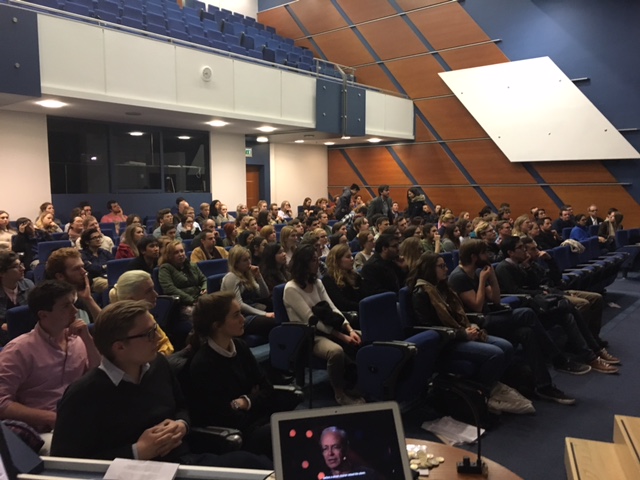 The Project
The Project
Effective altruism is the project of using time, money, and other resources in ways that help others the most. We’re interested in the following questions:
- Which philosophical views are compatible with–and lend support to–effective altruism? Effective altruism is supported by act consequentialism, but what about rule consequentialism, contractualism, Kantianism, pluralist deontology, or virtue ethics? What is the most plausible view that combines requirements to aid cost-effectively with non-consequentialist options and constraints?
- What is the most important cause? Fighting extreme poverty, eliminating animal suffering, reducing existential risks, or what? To what extent, if at all, should we take into consideration the well-being of possible future persons? How should we decide where to give if there is no clearly best cause?
- To what extent is progress in ethical theory itself a priority, from an effective altruist perspective? For example, how important is it to figure out what well-being consists in, or to solve problems in population ethics?
Selected Publications
- Theron Pummer: The Rules of Rescue: Cost, Distance, and Effective Altruism (Oxford University Press 2023).
- Effective Altruism: Philosophical Issues (volume edited by Hilary Greaves and Theron Pummer, Oxford University Press 2019).
- Elizabeth Ashford: “Severe Poverty as an Unjust Emergency” (The Ethics of Giving, Oxford University Press 2018).
Selected Recordings
- Theron Pummer on Philosophy Bites (2023).
- Theron Pummer on Philosophy Talk (2022).
- Peter Singer delivers the 2017 Knox Lecture.
- Presentations at 2017 The Ethics of Giving Conference.
Selected Events
- Theron Pummer “Compensated Altruism” (Social Philosophy and Policy conference, University of Arizona, December 2023)
- Theron Pummer “A Solution to the Non-Identity Problem” (Derek Parfit Memorial Lecture, University of Oxford, June 2024).
- Theron Pummer “The Rules of Rescue: Cost, Distance, and Effective Altruism, Author Meets Critics Session, including Julia Nefsky, Sergio Tenenbaum, Mollie Gerver, and Christian Barry” (Eastern APA in January 2024)
- Tyler Cowen (George Mason University), “The Philosophy of Effective Altruism” (CEPPA Talk, December 2022).
- Theron Pummer, “On Doing Good: The Future of Effective Altruism” (Yale Philanthropy Conference, February 2022).
- Ben Sachs and Theron Pummer, “Maximising Our Impact in Global Health—A Panel Discussion” (Event by One for the World: St Andrews, Effective Altruism St Andrews, and Students for Global Health St Andrews, November 2021).
- Theron Pummer, “Rescue, Cost, and Numbers” (Ira W. DeCamp Seminar at Princeton University, October 2019).
- Larry Temkin (Rutgers), talk on Effective Altruism and Obligations to the Distant Needy (public lecture for the St Andrews Philosophy Society and Effective Altruism St Andrews, February 2018, based on Lecture 3 of the 2017 Uehiro Lectures, delivered at Oxford).
- The Ethics of Giving Conference (St Andrews, May 2017 – keynote by Peter Singer, talks by Elizabeth Ashford, Adam Etinson, Ben Sachs, Tobias Jung, and many others); see Singer interviewed by The Saint and by Fife Today.
- Rufaida Al Hashmi and Theron Pummer, “The Philosophy and History of Effective Altruism” (for the St Andrews Branch of the Association of University Administrators, April 2017).
- Caspar Hare (MIT), “Rational Gifts” (CEPPA Talk, January 2017).
- Jeff McMahan (Oxford), “Doing Good and Doing the Best” (public lecture for the St Andrews Philosophy Society, November 2016) with comments by Theron Pummer.
- Conference on The Philosophical Foundations of Effective Altruism (St Andrews, March 2016).
- Theron Pummer, “Whether and Where to Give” (public lecture for the St Andrews Philosophy Society, October 2015); see this follow up piece by The Saint.
Affiliated Student Organisations
- Effective Altruism St Andrews (originally: Giving What We Can St Andrews, founded in 2015; 80,000 Hours St Andrews, founded in 2017).
Teaching
- In autumn 2016, Theron Pummer and Tim Mulgan co-taught an honours-level course at St Andrews on effective altruism. Pummer will teach this course again in 2023-24.
- In autumn 2017, Theron Pummer and Tim Mulgan co-taught an MLitt seminar on population ethics.
- Effective Altruism Teaching Resources
Funding
- Currently seeking funding for: teaching buyouts, postdoctoral researchers, PhD scholarships, postgraduate research assistants, and events.
- The March 2016 Effective Altruism conference was funded by the British Academy.
- The May 2017 Ethics of Giving conference is funded by the Mind Association, the Society for Applied Philosophy, the JN Wright Trust, and the Scots Philosophical Association.
People
- Theron Pummer (St Andrews Philosophy), Project Leader
- Ben Sachs (St Andrews Philosophy)
- Elizabeth Ashford (St Andrews Philosophy)
- Adam Etinson (St Andrews Philosophy)
- David Ulph (St Andrews Economics)
- Margaret Leighton (St Andrews Economics)
- Tobias Jung (St Andrews Management and Director of the Centre for the Study of Philanthropy & Public Good)
- L.A. Paul (Yale Philosophy)
- Peter Singer (Princeton University Center for Human Values)
- Hilary Greaves (Oxford Philosophy)
-

The Philosophical Foundations of Effective Altruism
A conference held in March 2016 at the University of St Andrews.

